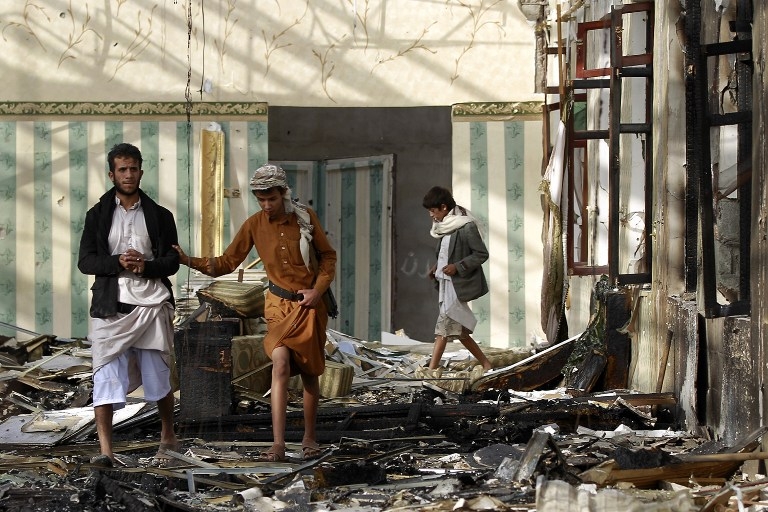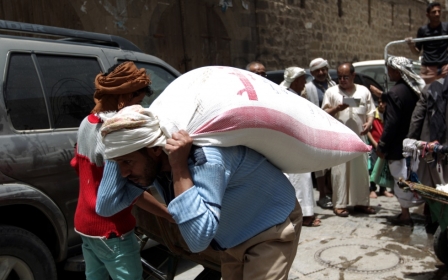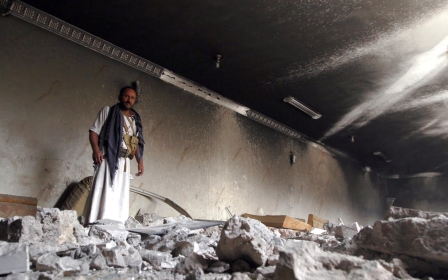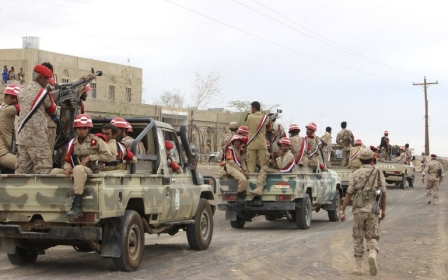Air strikes, clashes shake Yemen's UN humanitarian truce

A UN-proposed Yemen humanitarian truce got off to a shaky start on Saturday after Saudi-led coalition warplanes struck Houthi positions and clashes persisted between the group and pro-government fighters.
The six-day ceasefire took effect just before midnight Friday as agencies scrambled to rush desperately needed relief supplies to millions threatened by famine.
The Saudi-led coalition has not committed to the ceasefire, and the leader of the Houthis said he did not expect it to hold.
The "command of the coalition forces did not yet receive any request from the legitimate Yemeni government asking for a truce or cessation of military operations," it said.
Coalition spokesman Brigadier-General Ahmed al-Assiri said the bloc was "not concerned with this truce because it does not provide a commitment from the Houthi militia".
The alliance's leadership had not met UN representatives to coordinate a truce, he told Asharq al-Awsat daily.
Coalition warplanes raided Houthi positions in the central city of Taiz, where clashes between the Houthis and fighters loyal to exiled President Abd Rabbuh Mansour Hadi continued after the truce.
Violence raged overnight in Taiz, with witnesses saying the Houthis had also bombed several districts.
Yemen's official news agency, which is run by the exiled government, accused the Houthis and allied troops loyal to former president Ali Abdullah Saleh of sending reinforcements to the city ahead of the cessation.
In the south, coalition warplanes also hit Houthi fighters in the port city of Aden and nearby Lahj province, witnesses said.
The raids came after the Houthis bombed Aden, according to Abdullah al-Dayani, a spokesman of the southern fighters allied with Hadi.
Warplanes also flew sorties over Sanaa, but there were no attacks after midnight, witnesses said.
'Not much hope'
The six-day pause was declared after UN chief Ban Ki-moon received assurances from Hadi and the Houthis that it would be respected.
"We do not have much hope for the truce to succeed," said the Houthi chief Abdulmalik al-Houthi on television ahead of the truce deadline.
"The success of the truce depends on the commitment of the Saudi regime and is conditioned to a complete end to the aggression."
If the truce is respected, the World Health Organisation and its partners aim to reach more than 2.37 million people.
"This humanitarian pause will allow WHO and health cluster partners to more effectively scale up their response in affected governorates by reaching populations that have been cut off from care and urgently need life-saving health services," said WHO Yemen representative Ahmed Shadoul.
World Food Programme spokeswoman Abeer Etefa said Friday the truce was "our final hope" to reach the needy.
She told AFP that two ships carrying food and fuel were waiting off Aden to dock.
The truce comes more than a week after the UN declared Yemen a level-three humanitarian emergency, the highest on its scale, with nearly half the country facing a food crisis.
"It is imperative and urgent that humanitarian aid can reach all vulnerable people of Yemen unimpeded and through an unconditional humanitarian pause," said UN spokesman Stephane Dujarric.
UN aid agencies are ready to scale up operations, although the response to an appeal for $1.6 billion has been meagre, with just 13 percent of that amount received so far.
More than 21.1 million people - over 80 percent of Yemen's population - need aid, with 13 million facing food shortages.
The UN says the conflict has killed more than 3,200 people, about half of them civilians, since late March.
Etefa said the WFP delivered 9,000 tonnes of food to its warehouses in Yemen during the past week, adding the truce was needed to secure its mission.
"We hope to see an effective respect for the ceasefire, and to allow us to reach all parts of Yemen regardless of who controls them," she said.
UNICEF said it was stepping up nutrition screening, vaccinations and other life-saving interventions for millions of children, with teams having to "brave extremely hazardous conditions".
This is the second ceasefire since the coalition launched its March air campaign against the northern rebels and their allies, troops loyal to former president Saleh.
A five-day truce in May allowed aid to reach civilians, but UN efforts to prolong it failed.
Drone strikes kill 10 Qaeda suspects
While clashes between the Houthis and Hadi's supporters have continued, two missile strikes by unmanned American drones in southeastern Yemen killed 10 suspected members of Al-Qaeda, including three local chiefs, an official said Saturday.
The raids targeted a vehicle and a container loaded with weapons late Friday at the port of Mukalla, the provincial capital of Hadramawt, the local official said.
The strikes destroyed the arms container, he added.
The deaths bring to 23 the number of suspected Al-Qaeda militants killed by similar strikes in Yemen in less than three weeks, and follows the death of the second-in-command of Al-Qaeda's global network.
The group confirmed on 16 June the killing of Nasir al-Wuhayshi, who headed Al-Qaeda's Yemen branch, by US drone strike.
Washington regards that branch, known as Al-Qaeda in the Arabian Peninsula (AQAP), as its most dangerous and has kept up a drone war despite the pullout of US troops from Yemen in March as the country's war worsened.
The US still has drones and other aircraft at bases in Saudi Arabia and Djibouti.
AQAP was behind several plots against Western targets and claimed the January massacre at French satirical magazine Charlie Hebdo.
New MEE newsletter: Jerusalem Dispatch
Sign up to get the latest insights and analysis on Israel-Palestine, alongside Turkey Unpacked and other MEE newsletters
Middle East Eye delivers independent and unrivalled coverage and analysis of the Middle East, North Africa and beyond. To learn more about republishing this content and the associated fees, please fill out this form. More about MEE can be found here.




